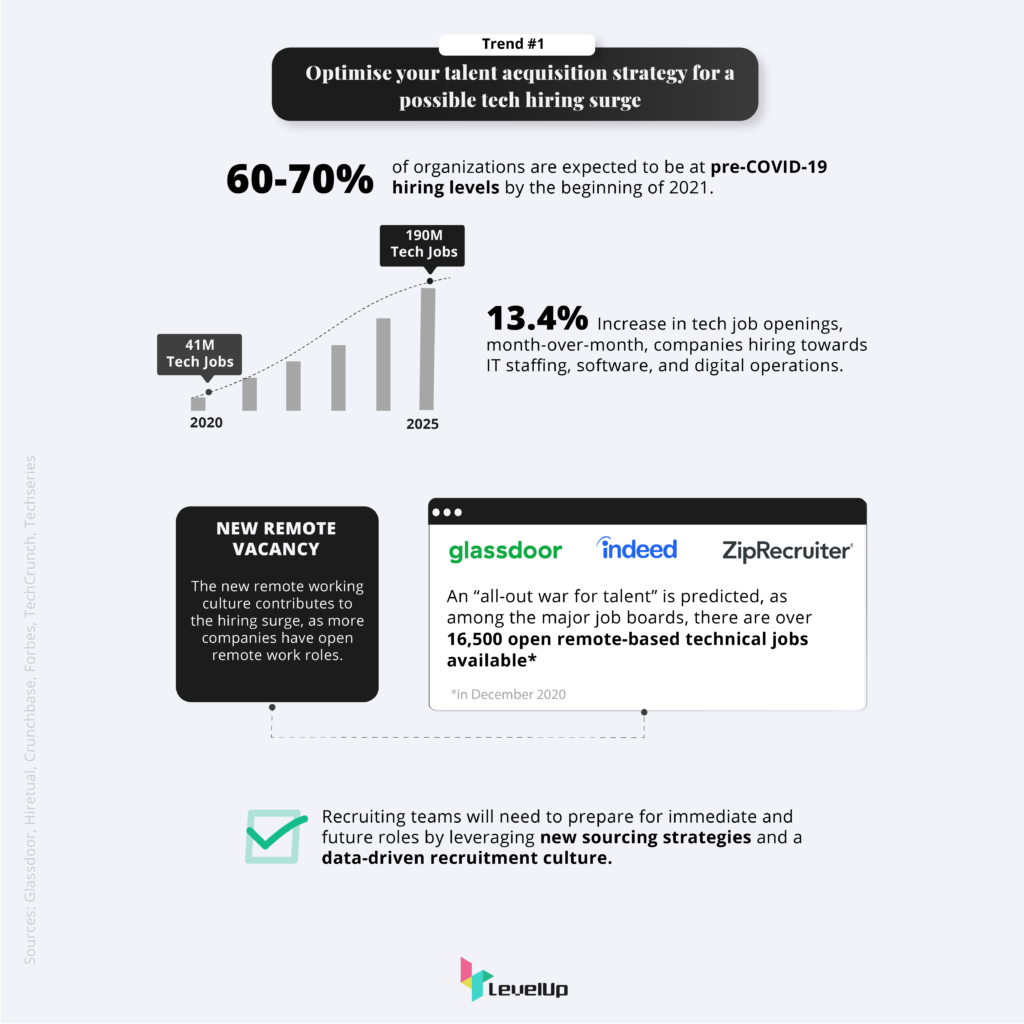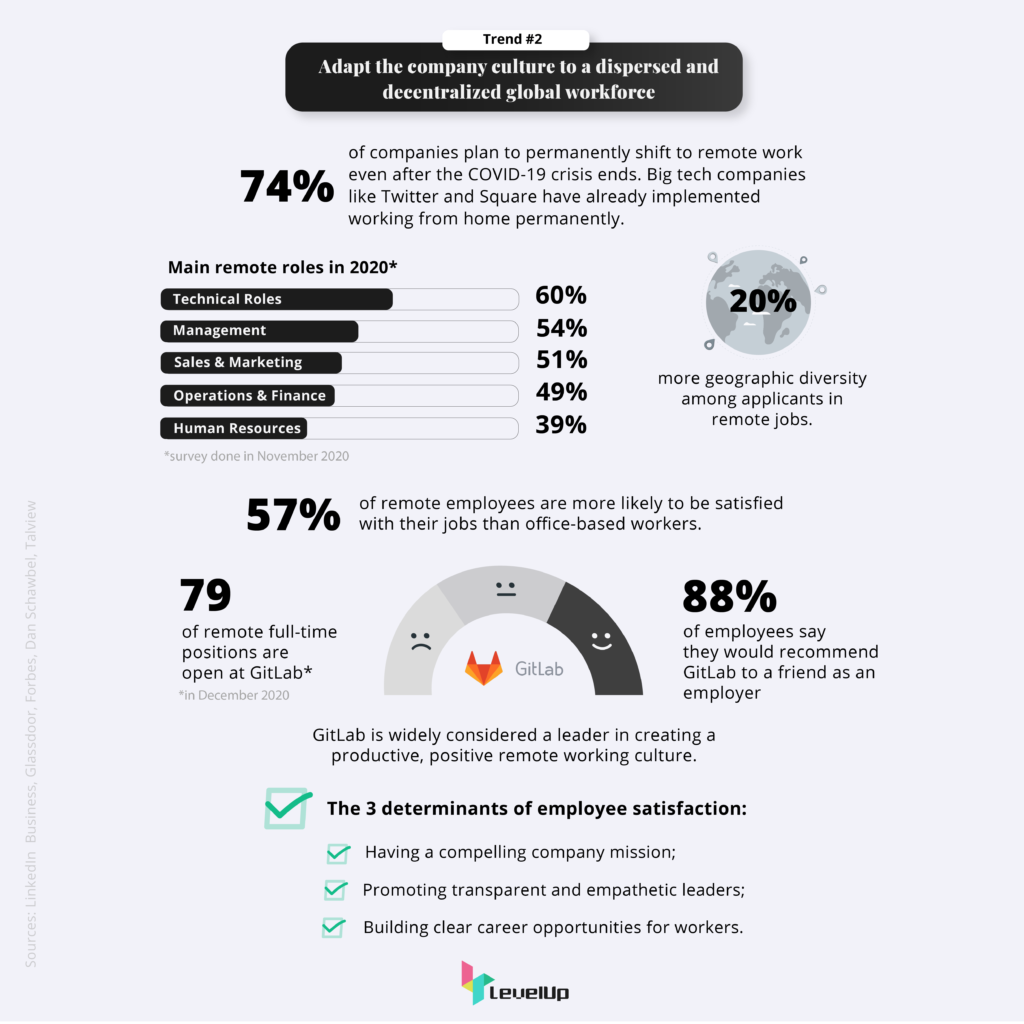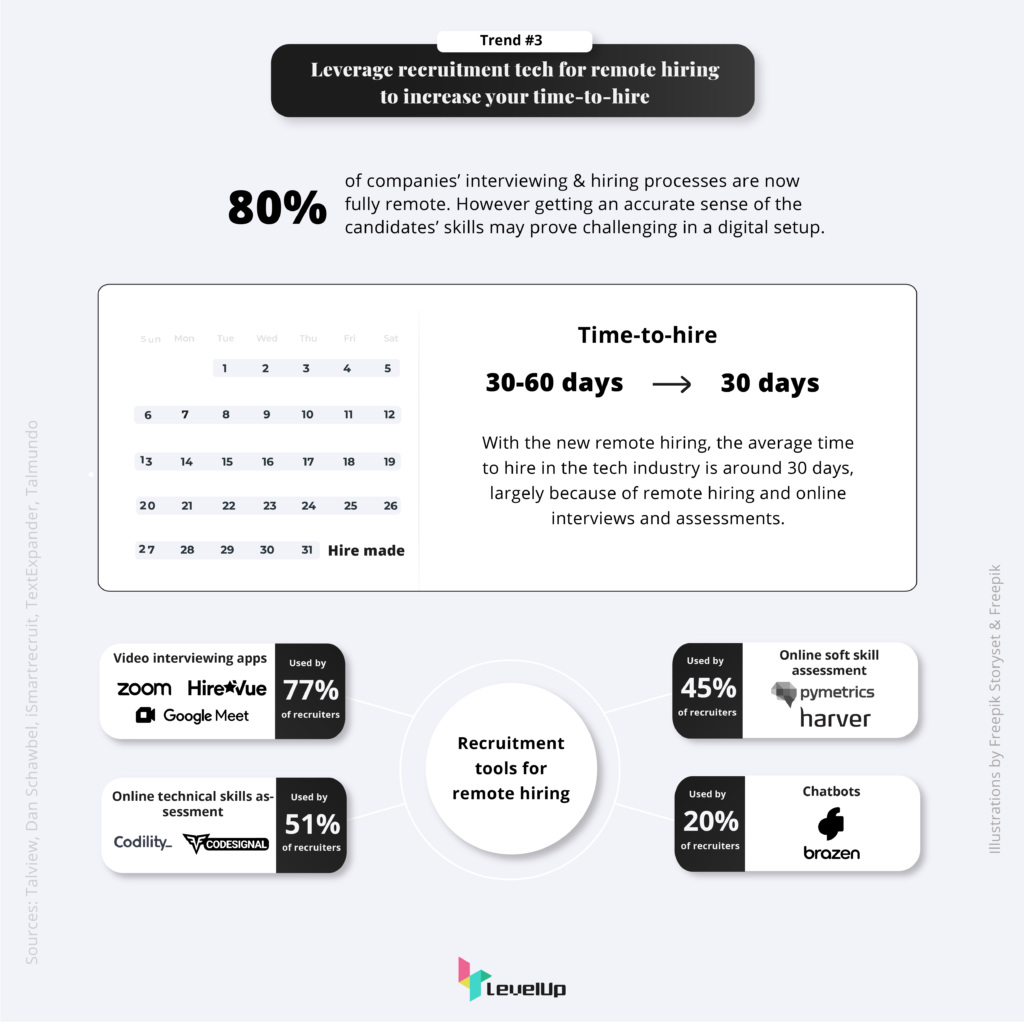It is safe to say that the past year has been a year of change in recruitment for many startups and scale-ups. And these changes will have a long-lasting impact on the recruitment strategies, hiring managers and even candidates for the years to come. However, with 2020 in the rearview mirror, in 2021 there’s a push to adapt and optimise your hiring strategy, intelligently, as new recruitment trends are rising.
From an emerging surge in tech hiring to a decentralised workforce and a shorter time-to-hire, we have gathered three major recruitment trends that will allow startups and scale-up to start 2021 in force:
Trend #1: Optimise your talent acquisition strategy for a possible tech hiring surge
Although the unemployment rate reached record levels by May 2020, in the startup ecosystem, only a part of the startups was directly hit by the pandemic. The majority of tech startups saw an increase in share value during COVID-19. However, the hiring plan was the first one to be affected by the pandemic, as 40% of startups enacted hiring freezes, and 32% were hiring less. These hiring freezes will eventually need to be made up for, thus expecting 60 to 70% of organisations to be at pre-covid 19 hiring levels by the beginning of 2021.
Once the pandemic hit and quarantine had been instated, the consumer demand turned into e-commerce. Thus, many companies were forced to shift from offline to online, and their hiring priorities have changed to tech workforce.
With an increase in tech job openings of 13.4% month-over-month and a lot of time to make up for due to the hiring freeze, a surge in tech hiring is expected over the next months.
However, the shift to online will have a long-term impact on the high demand for tech skills, as it is predicted that the number of “technology-oriented” jobs will increase nearly five-fold by 2025, from 41 million in 2020 to 190 million in 2025.
In order to prepare for the tech hiring surge, startups and scale-ups will need to expand their sourcing strategies and plan for immediate and future roles by leveraging a data-driven recruitment culture. Here are some tips on how you can do it:
1. Adapt your sourcing strategy
A good starting point for an improved sourcing strategy is to look where others don’t think to. In 2021, LinkedIn is becoming a less popular sourcing platform, with only 9% of recruiters planning to use it. However, more recruiters are heading towards Facebook and Twitter in combination with virtual tech communities such as GitHub, Stack Overflow and Kaggle.
2. Implement a data-driven culture in your recruitment strategy
If 2020 has taught us anything is that making decisions on the go doesn’t cut it anymore. Therefore, implementing a data-driven culture in your recruitment strategy will allow you to have a clear understanding of who your candidates are, where they are, how to attract them and how much it will cost. Some of the most common recruitment KPIs to keep an eye on are: speed-based recruitment metrics (time to hire, time per stage, time to fill), quality-based (source of hire, submission to acceptance rate, retention rates) and cost-based (cost per hire, ad performance, talent pool growth).
Pick out only the metrics relevant to your goals and use them to make informed decisions for your recruitment strategy.
Trend #2: Adapt the company culture to a dispersed and decentralized global workforce
Remote work is here to stay, as 74% of companies plan to permanently shift to remote work even after the COVID-19 crisis ends. Big tech companies are already paving the way for it, as Twitter, Facebook and Square have already announced that they will allow employees to work from home indefinitely.
The permanent remote culture is opening doors for a more geographically diverse workforce, with remote jobs resulting in over 20% more geographic diversity among applicants.
Also, more remote employees are more likely to report being satisfied with their jobs than office-based workers. These statistics are also reflected at Gitlab. With more than 79 remote full-time positions open in December 2020, the company is considered a leader in creating a productive, positive remote working culture, as 88% of employees say they would recommend Gitlab as an employer to a friend.
1. Maintain a high employee satisfaction
When it comes to having a high employee satisfaction in a remote working environment, there are three influencing factors: having a compelling company mission, promoting, transparent and empathetic leaders, and building clear, career opportunities for workers.
2. Communication is key in all processes
In order to maintain your company culture while being remote, communication is key. Whether it’s the form of virtual team-building activities, regular meetings, or even meaningful and vulnerable 1-on-1s keep your employees engaged and in contact with one another. Adapt your company’s culture on all levels, from your remote recruitment process to virtual onboarding, collect feedback regularly and adjust accordingly.
Trend #3: Leverage tech & automation for remote hiring to increase your time to hire
As startups and scale-ups are shifting to online, the majority has also adapted their recruitment processes to a remote environment. According to a study by Talview, 80% of the companies said their interviewing and hiring processes are now fully remote. Shifting to remote hiring has brought the average time-to-hire to 30 days in the tech industry, instead of 30-60 days, primarily because it’s no longer possible to hold on-premise interviews and assessments.
With the shift to remote hiring, more recruiters are leveraging recruitment tech to interview, assess and communicate with candidates. Talview’s study mentions that recruiters are planning to use recruitment tech even after the pandemic. Among their remote hiring stack, there are video interviewing platforms (used by 76.9% of recruiters) such as Zoom, Google Meet, HireVue, online technical skills assessment platforms (used by 51.7% of recruiters) such as Codility, CodeSignal, HackerRank Developer Skills, recruiting automation (used by 42% of recruiters) – Hiretual, Recruitee, online soft skill assessment platforms (used by 44,8% of recruiters) – Harver, Pymetrics and chatbots (used by 20% of recruiters) such as Brazen.




